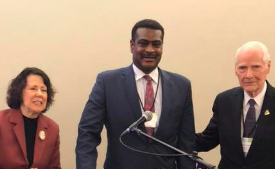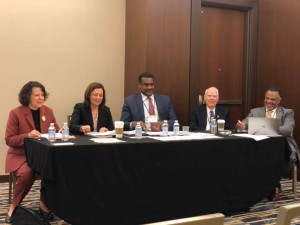National Association of Social Workers (NASW) leaders on Jan. 18 participated in a panel at the Society for Social Work and Research (SSWR) conference to discuss how to improve the collective impact across the profession and how to bring social work research to the national policy agenda.
The panelists included: Sarah Gehlert, PhD, dean of the University of South Carolina and president of the American Academy of Social Work and Social Welfare; Ron Manderscheid, PhD, executive director of the National Association of County Behavioral Health and Developmental Disability Directors; Martell Teasley, PhD, dean of the University of Utah, College of Social Work, and president of the National Association of Deans and Directors in Social Work (NADD); and Angelo McClain, PhD, chief executive officer of the National Association of Social Workers; and Sarah Christa Butts, LMSW, Director of Public Policy, National Association of Social Workers.
Panel Overview
A paradigm shift in the relationship between research and policy is needed to address society’s most vexing social problems. We are facing unprecedented political polarization and partisanship at a time when we know research results routinely take almost 20 years to enter practice.
This lag in “discovery to implementation” is especially problematic for social work because of the field’s commitment to improving the life conditions of vulnerable individuals, groups, and communities, whose functioning frequently is challenged by increasingly restrictive local, state, and federal policies.
Ensuring that social work research findings reach key policy makers to inform and influence policy is dependent on the ability of social work researchers, advocates, policy administrators, and legislators to communicate in a way that is timely and effective, and speeds translation.
In this session, representatives from the American Academy of Social Work and Social Welfare, the Grand Challenges for Social Work, the National Association of Social Workers, and the National Association of Deans and Directors of Social Work presented their positions on how to achieve optimal communication between their groups to accelerate the flow of research findings to inform policy. The group of presenters used the real-life example of gun violence in schools, relying on a jointly-sponsored June 2019 Congressional Briefing in which they participated.
New roles for faculty in advocacy were discussed, including the importance of coalition affiliation and development; faculty involvement in drafting and presenting testimony; and congressional briefings and visits with elected representatives to explain key research findings that support legislation, as well as relationship development with other national organizations outside the social work field.
Consensus toward Next Steps
Over the course of the session, a broad consensus emerged that the major, national social work organizations will need to form an ongoing working coalition to facilitate the implementation of better, research-based policy. Further, when possible, this coalition also should foster continuing relationships with other coalitions outside the field that share similar policy goals. Work on the formation and implementation of the social work coalition should begin immediately. It was recommended that the key social work organizations designate representatives to undertake this important work.
Take time to review the slide presentations from the event:
Leveraging Social Work Research Expertise to Influence Public Policy
Angelo McClain’s Remarks on Research Dissemination
Sarah Butts, LMSW, is NASW’s Director of Public Policy and Ron Manderscheid, PhD, is Executive Director of the National Association of County Behavioral Health and Developmental Disability Directors.





